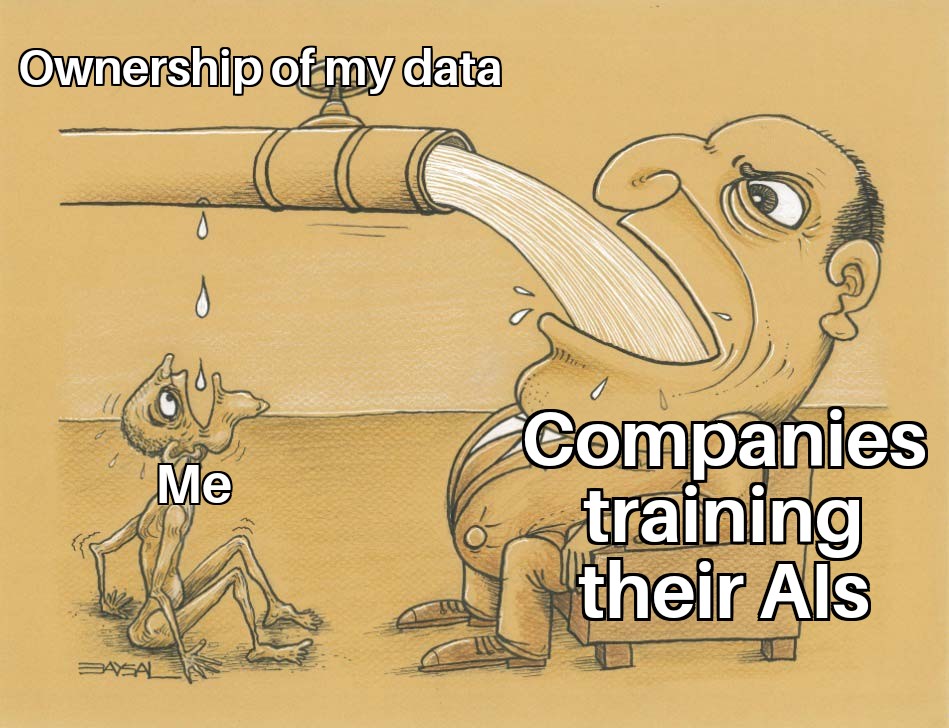836
you are viewing a single comment's thread
view the rest of the comments
view the rest of the comments
this post was submitted on 14 Jun 2024
836 points (97.3% liked)
memes
16863 readers
781 users here now
Community rules
1. Be civil
No trolling, bigotry or other insulting / annoying behaviour
2. No politics
This is non-politics community. For political memes please go to !politicalmemes@lemmy.world
3. No recent reposts
Check for reposts when posting a meme, you can only repost after 1 month
4. No bots
No bots without the express approval of the mods or the admins
5. No Spam/Ads/AI Slop
No advertisements or spam. This is an instance rule and the only way to live. We also consider AI slop to be spam in this community and is subject to removal.
A collection of some classic Lemmy memes for your enjoyment
Sister communities
- !tenforward@lemmy.world : Star Trek memes, chat and shitposts
- !lemmyshitpost@lemmy.world : Lemmy Shitposts, anything and everything goes.
- !linuxmemes@lemmy.world : Linux themed memes
- !comicstrips@lemmy.world : for those who love comic stories.
founded 2 years ago
MODERATORS

Like a corporation that pays wages. Yeah, trying the same thing and expecting a different outcome.
Yes, and legislation that forces companies to pay higher wages (or in this case, royalties given back to users) is itself a form of wealth distribution that can help to reduce income inequality.
We can talk about the overthrow of capitalism, if you like, but that's a whole separate issue.
You want to force people (not just companies) to pay for use of a new kind of intellectual property. That is capital income. You want money to go to property owners.
If you think about this for a second, you should realize that this means lower wages. If a bigger share goes to property owners, then employees must have a smaller share. The money can't come from anywhere else.
I thought of something that maybe gets this across. Think about roads. We all pay for them with taxes. Companies use these roads for free to make a profit. EG Amazon runs delivery vehicles on public roads.
The (center-)left take on that is: "You didn't build that." It can be an argument for progressive taxation and even a wealth tax.
Then there's people who say that we should privatize all the roads. Let Amazon pay a toll for using those roads. Is it clear that this is a conservative policy?
I see what you're getting at, but that's a flawed analogy.
Firstly, public roads are paid for collectively through taxes but everyone can benefit from them, not just large multinational corporations. That's not currently how user data is used in the context we are discussing, since the users themselves do not benefit materially from the data they produce.
A more accurate use of a road analogy would be to say that, at the moment, the users build the roads themselves (generate their data), and the private companies say to the users "Thanks very much for building the roads, we're now going to charge anyone who wants to use them and keep 100%. Oh, and you have no ownership rights, so we can restrict access to these roads as we see fit."
An individual can use the roads if the can afford a car. Amazon must be operating 1000s or 10.000s of vehicles in the US alone. Clearly, some benefit more than others. Some win at Monopoly.
Are we at least agreed that it is a conservative policy? If you carve up the roads and gift them to the people who own the land next to the roads, it's still conservative. It will lead to greater inequality and poverty. It's not left-wing redistribution.
I don't know what this means. What is currently happening that is like that? Besides, you want data to be owned, and an owner can restrict access. Shouldn't you be all for that?